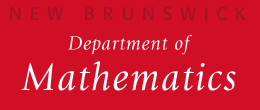Earning a Mathematics Ph.D. is a long and difficult undertaking, and inevitably, for a variety of reasons, many students will conclude their studies without a Ph.D. We are proud that a significant majority of our students successfully complete our program.
Here is a table that provides, for each entry year from 1995 to 2005, the completion status of our students (as of October, 2010). As shown, of 153 students who joined our Ph.D. program during that period, 100 of them (65.3%) have completed their Ph.D., with 84 (54.9%) completing their degree by October of their 6th year. Among the students who have not earned a degree, 8 are still in the program, and expected to complete their degree.
These figures are in sharp contrast with the six-year completion rate of 36.8% reported by the recent NRC study of graduate programs. This reportedly low completion rate (together with our reportedly low, but also misleading academic job placement rate ) was in large part responsible for our program receiving a relatively low comparative ranking on student outcomes. But our data shows a six-year completion rate that is about 18% higher.
There are two reasons we can identify for this discrepancy:
Thus, because of one unusual entry year, and a technicality in defining ``six-year completion'' our six-year completion rate drops from about 55% to 43%. Moreover, even this 43% figure is more than 6% higher than the figure reported by the NRC, and we don't know the reason for this remaining discrepancy.
Here is an overall analysis of the data concerning our program from the recent NRC study.








